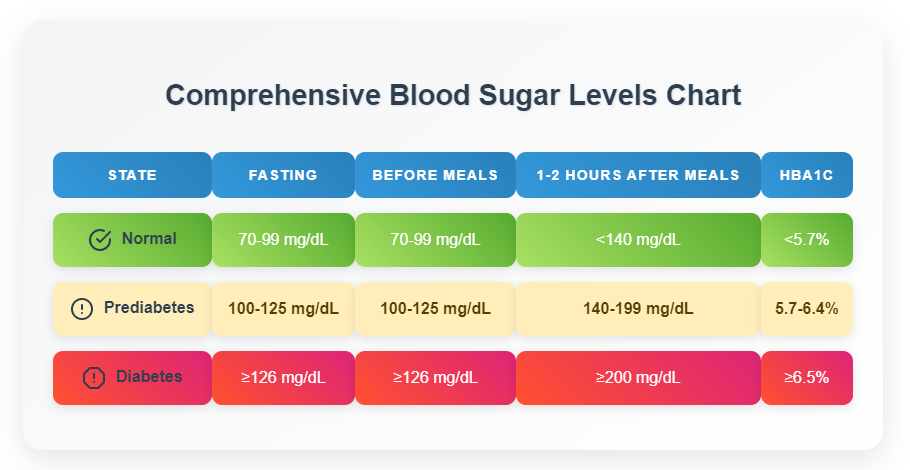Your cart is empty

Normal Blood Sugar Levels: Understanding Your Glucose Readings
Knowing your blood sugar levels is so important for staying healthy and avoiding problems like diabetes. Whether you're checking your glucose for health reasons or just want to be at your best, understanding what normal blood sugar levels are can help you make smart choices about your health.
What Are Normal Blood Sugar Levels?
Normal blood sugar (also called blood glucose) is the amount of sugar in your blood that's just right for your body. Your body uses this sugar for energy, so keeping it at the right level is key to feeling good and staying healthy.
Your blood sugar can change based on things like:
- What time of day it is
- When you last ate
- How old you are
- Your overall health
For most adults without diabetes, normal blood sugar levels are:
- When you haven't eaten for 8 hours or more: 70-99 mg/dL
- Before meals: 70-99 mg/dL
- 1-2 hours after eating: Less than 140 mg/dL
Keep in mind, these are just average numbers. Your doctor might set different targets for you based on your personal health needs.
Blood Sugar Levels Chart
Here's an easy-to-read chart that shows different blood sugar ranges:
Comprehensive Blood Sugar Levels Chart
| State | Fasting | Before Meals | 1-2 Hours After Meals | HbA1c |
|---|---|---|---|---|
| Normal | 70-99 mg/dL | 70-99 mg/dL | <140 mg/dL | <5.7% |
| Prediabetes | 100-125 mg/dL | 100-125 mg/dL | 140-199 mg/dL | 5.7-6.4% |
| Diabetes | ≥126 mg/dL | ≥126 mg/dL | ≥200 mg/dL | ≥6.5% |
This chart gives you a quick look at healthy blood sugar levels, and shows when levels might mean prediabetes or diabetes. It's a handy tool to help you understand your own blood sugar readings.
Understanding Your Blood Sugar Readings
Knowing what your blood sugar numbers mean is key to keeping them in a healthy range. Here's a breakdown of the different measurements:
- Fasting Blood Sugar: This is your blood sugar when you haven't eaten for at least 8 hours. It should be between 70-99 mg/dL.
- Before Meals: Your blood sugar before you eat should be about the same as your fasting level: 70-99 mg/dL.
- After Meals: Your blood sugar usually goes up after you eat. For people without diabetes, it should be less than 140 mg/dL about 1-2 hours after eating.
- HbA1c: This test shows your average blood sugar over the past 2-3 months. A normal level is below 5.7%.
Remember, these are average numbers. Your doctor might have different targets for you based on your personal health situation.

Keeping Your Blood Sugar Levels Healthy
Keeping your blood sugar in a healthy range is really important for feeling good overall. Here are some tips to help you do that:
- Eat a Balanced Diet: Mix up your meals with whole grains, lean proteins, and healthy fats. Try to avoid processed foods and sugary drinks. If you have diabetes, starting your day with a diabetes-friendly breakfast can help keep your blood sugar steady all day.
- Exercise Regularly: Being active helps your body use sugar better, which keeps your blood sugar levels healthier.
- Eat at Regular Times: Try to eat your meals around the same time each day to avoid big ups and downs in your blood sugar.
- Drink Enough Water: Staying hydrated helps your body get rid of extra sugar through pee.
- Manage Stress: Too much stress can mess with your blood sugar, so find ways to relax that work for you.
Things That Can Affect Your Blood Sugar
Lots of things can change your blood sugar levels:
- What You Eat: Food, especially carbs, can really impact your blood sugar.
- Exercise: Being active can lower your blood sugar and help your body use insulin better.
- Stress: When you're stressed, your body can release hormones that raise your blood sugar.
- Being Sick: Illness can make your blood sugar go up.
- Medicines: Some medications can change your blood sugar levels.
- Sleep: Not getting enough sleep can mess with how your body handles sugar.
Checking Your Blood Sugar Levels
Regularly checking your blood sugar is important for keeping it at healthy levels. Here are a couple ways to do it at home:
- Glucose Meter: This small device uses a tiny drop of blood to measure your blood sugar right away.
- Continuous Glucose Monitor (CGM): This gadget checks your sugar levels every few minutes throughout the day and night.
How often you should check depends on things like whether you have diabetes and what kind of treatment you're on. Always follow your doctor's advice about how often to check.
Eating Right for Healthy Blood Sugar
What you eat plays a big role in keeping your blood sugar levels healthy. If you're managing diabetes or just want to keep your blood sugar in check, you might want to try protein shakes made for people with diabetes. These drinks are specially made to help keep your blood sugar steady.
For snacks on the go that won't make your blood sugar spike, try protein bars designed for people with diabetes. These snacks are made to give you energy without causing big jumps in your blood sugar.
When to Talk to Your Doctor
While it's great to aim for healthy blood sugar levels, sometimes you might need to check in with your doctor. Reach out if:
- Your blood sugar readings are often outside the healthy range
- You often feel like your blood sugar is too high or too low
- You're having trouble keeping your blood sugar steady even when you're trying to be healthy
Regular check-ups are important, even if your blood sugar seems okay. These visits let your doctor make sure everything's on track and catch any problems early.
Conclusion
Understanding and keeping your blood sugar levels normal is super important for your overall health. By knowing what healthy blood sugar levels are, checking your levels regularly, and making lifestyle choices that help keep your blood sugar steady, you're taking big steps towards better health.
Remember, the blood sugar chart in this article is a general guide. Your personal healthy range might be different based on your age, overall health, and other factors. Always work with your doctor to figure out the best target range for you and come up with a plan to keep your blood sugar levels healthy.
By staying informed and taking action to manage your blood sugar levels, you're doing something great for your long-term health and well-being. Keep it up!
Author: Carrie H. Carrie is a passionate health and nutrition writer who transforms complex medical research into accessible, evidence-based content to empower readers to make informed choices about their wellbeing. With a background in science and a dedication to helping others live healthier lives, she provides thoughtful analysis of the latest studies and practical, actionable advice readers can apply to their own lives. |
Reviewed By: Dr. Kevin Huffman Dr. Huffman is an accomplished board-certified bariatric physician with extensive clinical experience and expertise in treating obesity. He has trained countless healthcare providers and founded American Bariatric Consultants to develop highly sought-after protocols, training materials and continuing education used widely by medical societies, hospitals and physicians. Dr. Huffman's impact reaches far beyond direct patient care, as he actively prepares the next generation of physicians to achieve board certification in bariatrics, thereby exponentially expanding access to this vital medical treatment. |
- Choosing a selection results in a full page refresh.













